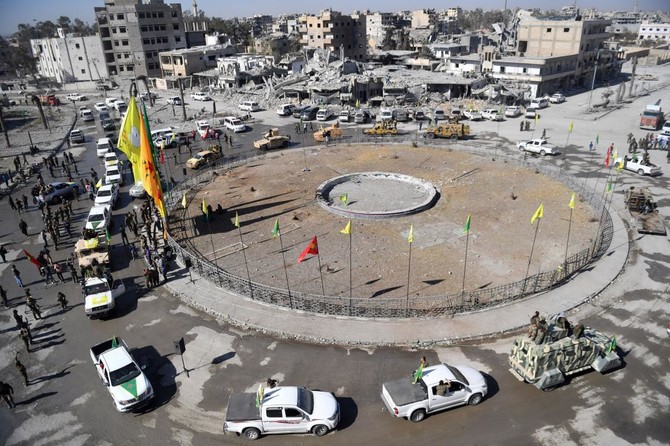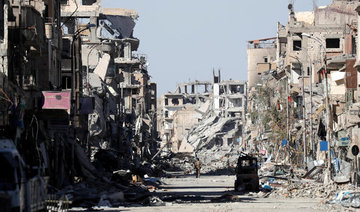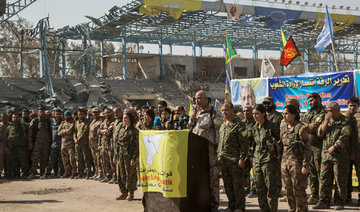RAQQA, SYRIA: Dozens of civilians at a checkpoint into Raqqa were pleading to be let through to inspect their homes when an explosion ripped through the air: one resident had slipped in.
The man had managed to reach his nearby neighborhood despite a clear ban on civilian entry into the devastated Syrian city and triggered an explosive device left behind by the Daesh group.
Ambulances and fighters from the Syrian Democratic Forces (SDF) who retook Raqqa this month screeched past the panicked civilians at the checkpoint on the city’s western edge.
The victim’s brother, who snuck into Raqqa with him, survived the blast unscathed but his face was livid with shock.
“My brother and I went to inspect our ceramics workshop. A mine went off and he died,” he said, as people tended to him in the Al-Dariya neighborhood.
Next to a pile of rubble and mangled iron, his dead brother lay on his side, still straddling his motorbike and his face covered in white dust. A huge tarp bag was still strapped to the rack.
The US-backed SDF took full control of Raqqa on October 17, wrapping up an operation that lasted more than four months to capture a city that had been the inner sanctum of IS’s now moribund “caliphate.”
Hundreds of thousands of people fled the city since 2014 and by the time the SDF retook it, Raqqa had become a ghost town of collapsed buildings.
The jihadists used Raqqa as a hub from which they organized their administration and projected power for more than three years.
Routed IS fighters are now defending their last redoubts further down the Euphrates Valley and along the border with Iraq but the bombs they left behind are still killing people.
The team of SDF medics that morning were not retrieving their first victim of the week: at least 14 other people, including nine civilians, were killed since the fighting ended.
The SDF has issued clear instructions making Raqqa off-limits but gaggles of civilians wait every day at the city gates for a chance to look for what might be left of their homes.
Despite the heavy human toll that IS’s booby traps, unexploded roadside bombs and other mines are taking, a group waited on the edge of the western neighborhood of Sabahiya, trying to convince SDF fighters to let them through.
Men sat patiently on the saddles of their motorbikes, while women sat looking expectantly toward the city’s craggy, levelled skyline as children played around them.
The civilians seemed determined to ignore the warnings and see their homes but the SDF was having none of it.
“One man came from Kobani to see his house, a mine exploded and we just finished organizing his burial,” a young Kurdish fighter said, raising his voice as residents implored him to open the road.
“We’ve been telling you not to go in, there are mines everywhere but you still sneak in,” the young fighter shouted, pumping his upturned palms in annoyed disbelief.
Umm Abdel Rahman cried because she was barred from returning to her neighborhood of Al-Rumaniya, in western Raqqa.
“My house is over there, all my memories are there, the pictures of my wedding,” the young lady said, tears running down her cheeks. She has not heard from her husband in almost three weeks.
Nearby, another young woman who gave her name as Amina said both her brothers had been missing for four days.
“They had gone to our house in Al-Dariya and they never came back. I came to find them,” she said. “My younger brother already lost a foot in a land mine blast.”
A chubby-cheeked baby saddled on her hip, Amina said she was bent on entering Raqqa regardless. “Even if it kills me, I will go in to find my brothers.”
In Raqqa, jihadists are gone but they can still kill
In Raqqa, jihadists are gone but they can still kill

Israeli strikes hit Yemen’s Sanaa and Hodeidah, Houthis’ Al Masirah TV says

- Houthis said that multiple air raids targeted an airport, military air base and a power station in Yemen
JERUSALEM: Multiple air raids hit several targets in Houthi-held areas of Yemen on Thursday, witnesses and the militia said, with their media saying Israel launched the strikes.
Sanaa airport and the adjacent Al-Dailami base were targeted along with a power station in Hodeida, in attacks that the Houthis’ Al-Masirah TV channel called “Israeli aggression.”
There was no immediate comment from Israel on the strikes, which come a day after Yemen fired a ballistic missile and two drones at Israel.
On Saturday, a Houthi missile attack left 16 people wounded in Tel Aviv.
Saturday’s incident had prompted a warning from Israeli Prime Minister Benjamin Netanyahu, who said he had ordered the destruction of Houthi infrastructure.
“I have instructed our forces to destroy the infrastructure of Houthis because anyone who tries to harm us will be struck with full force,” Netanyahu said in parliament.
“We will continue to crush the forces of evil with strength and ingenuity, even if it takes time.”
Syria authorities say torched 1 million captagon pills

DAMASCUS: Syria’s new authorities torched a large stockpile of drugs on Wednesday, two security officials told AFP, including one million pills of captagon, whose industrial-scale production flourished under ousted president Bashar Assad.
Captagon is a banned amphetamine-like stimulant that became Syria’s largest export during the country’s more than 13-year civil war, effectively turning it into a narco state under Assad.
“We found a large quantity of captagon, around one million pills,” said a balaclava-wearing member of the security forces, who asked to be identified only by his first name, Osama, and whose khaki uniform bore a “public security” patch.
An AFP journalist saw forces pour fuel over and set fire to a cache of cannabis, the painkiller tramadol, and around 50 bags of pink and yellow captagon pills in a security compound formerly belonging to Assad’s forces in the capital’s Kafr Sousa district.
Captagon has flooded the black market across the region in recent years, with oil-rich Saudi Arabia a major destination.
“The security forces of the new government discovered a drug warehouse as they were inspecting the security quarter,” said another member of the security forces, who identified himself as Hamza.
Authorities destroyed the stocks of alcohol, cannabis, captagon and hashish in order to “protect Syrian society” and “cut off smuggling routes used by Assad family businesses,” he added.
Syria’s new Islamist rulers have yet to spell out their policy on alcohol, which has long been widely available in the country.
Since an Islamist-led rebel alliance toppled Assad on December 8 after a lightning offensive, Syria’s new authorities have said massive quantities of captagon have been found in former government sites around the country, including security branches.
AFP journalists in Syria have seen fighters from Islamist group Hayat Tahrir Al-Sham (HTS) set fire to what they said were stashes of captagon found at facilities once operated by Assad’s forces.
Security force member Hamza confirmed Wednesday that “this is not the first initiative of its kind — the security services, in a number of locations, have found other warehouses... and drug manufacturing sites and destroyed them in the appropriate manner.”
Maher Assad, a military commander and the brother of Bashar Assad, is widely accused of being the power behind the lucrative captagon trade.
Experts believe Syria’s former leader used the threat of drug-fueled unrest to put pressure on Arab governments.
A Saudi delegation met Syria’s new leader Ahmed Al-Sharaa in Damascus on Sunday, a source close to the government told AFP, to discuss the “Syria situation and captagon.”
Jordan in recent years has also cracked down on the smuggling of weapons and drugs including captagon along its 375-kilometer (230-mile) border with Syria.
Jordan says 18,000 Syrians returned home since Assad’s fall

AMMAN: About 18,000 Syrians have crossed into their country from Jordan since the government of Bashar Assad was toppled earlier this month, Jordanian authorities said on Thursday.
Interior Minister Mazen Al-Faraya told state TV channel Al-Mamlaka that “around 18,000 Syrians have returned to their country between the fall of the regime of Bashar Assad on December 8, 2024 until Thursday.”
He said the returnees included 2,300 refugees registered with the United Nations.
Amman says it has hosted about 1.3 million Syrians who fled their country since civil war broke out in 2011, with 650,000 formally registered with the United Nations.
Lebanon hopes for neighborly relations in first message to new Syria government

- Lebanon’s Iran-backed Hezbollah played a major part propping up Syria’s ousted President Bashar Assad through years of war
- Syria’s new Islamist de-facto leader Ahmed Al-Sharaa is seeking to establish relations with Arab and Western leaders
DUBAI: Lebanon said on Thursday it was looking forward to having the best neighborly relations with Syria, in its first official message to the new administration in Damascus.
Lebanese Foreign Minister Abdallah Bou Habib passed the message to his Syrian counterpart, Asaad Hassan Al-Shibani, in a phone call, the Lebanese Foreign Ministry said on X.
Lebanon’s Iran-backed Hezbollah played a major part propping up Syria’s ousted President Bashar Assad through years of war, before bringing its fighters back to Lebanon over the last year to fight in a bruising war with Israel – a redeployment which weakened Syrian government lines.
Under Assad, Hezbollah used Syria to bring in weapons and other military equipment from Iran, through Iraq and Syria and into Lebanon. But on Dec. 6, anti-Assad fighters seized the border with Iraq and cut off that route, and two days later, Islamist militants captured the capital Damascus.
Syria’s new Islamist de-facto leader Ahmed Al-Sharaa is seeking to establish relations with Arab and Western leaders after toppling Assad.
Iraqi intelligence chief discusses border security with new Syrian administration

BAGHDAD: An Iraqi delegation met with Syria’s new rulers in Damascus on Thursday, an Iraqi government spokesman said, the latest diplomatic outreach more than two weeks after the fall of Bashar Assad’s rule.
The delegation, led by Iraqi intelligence chief Hamid Al-Shatri, “met with the new Syrian administration,” government spokesman Bassem Al-Awadi told state media, adding that the parties discussed “the developments in the Syrian arena, and security and stability needs on the two countries’ shared border.”
















